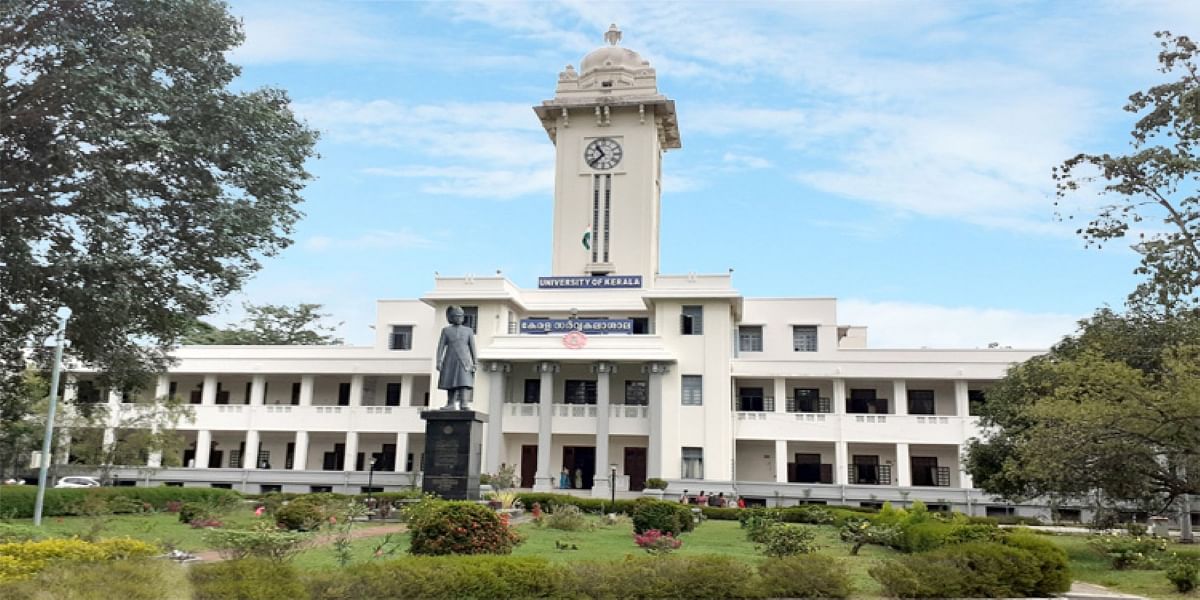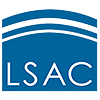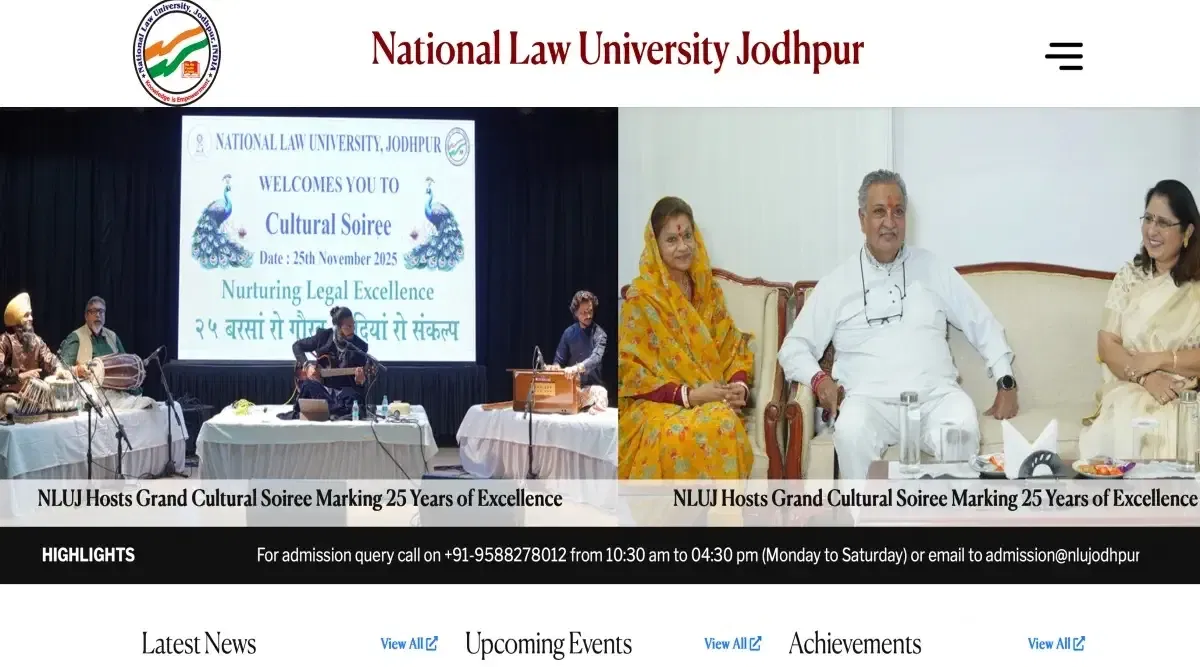LLB Syllabus and Subjects 2026

LLB syllabus aims to thoroughly grasp various subjects, including Labour Laws, Constitutional Law, Administrative Law, Jurisprudence, Criminal Law, Taxation Law, Law of Evidence, Family Law, Law of Torts, Law of Contract, etc. LLB 3 Year syllabus is divided into 6 semesters covering core and elective subjects. Students also learn practical application of subjects through internship and moot court mock trials in the third year.
The LLB subjects cover both fundamental and advanced topics like an overview of the legal system, court structures, formation of contracts, terms and conditions, nature and principles of equity, corporate structure and governance, ethical considerations for legal professionals, etc.
Students can also pursue 5-year LLB courses such as BCom LLB, BBA LLB, BSc LLB, etc., where the syllabus varies depending on the discipline. After completion of the LLB course, students can build their careers in various sectors with diverse job roles such as Legal Manager, Attorney, Lawyer, General Counsel, Legal Advisor, etc.
Table of Contents
Semester-Wise LLB Syllabus
The 3 year LLB syllabus covers some of the important subjects such as taxation law, family law, environmental law, etc. First-year LLB subjects concentrate primarily on foundational topics of Law and legal practices. Moreover, the second and third-year syllabi enable students to select electives such as commercial law, international economics law, commercial law, etc., making their curriculum diverse and adaptable.
Below listed is the semester-wise LLB syllabus bifurcated into the first, second, and third year:
LLB First Year Syllabus
LLB 1st year syllabus helps students understand constitutional amendments, legal concepts, principles, and systems, along with an overview of basic legal writing and analysis. Listed below is the LLB First Year Syllabus:
| Semester I | Semester II |
| English | Family Law II |
| Family Law I | Law of Contract II |
| Law of Contract I | Constitutional Law II |
| Law of Crimes | Legal Language and Legal Writing |
| Constitutional Law I | Healthcare Law (Elective) |
| Women and Law (Elective) | Law and Media (Elective) |
| Criminology and Penology (Elective) | Election Law (Elective) |
| RTI and PIL (Elective) | - |
LLB 2nd Year Syllabus
LLB 2nd year subjects cover topics like constitutional amendments, judicial review, legal research methodologies, legal positivism, the role and responsibilities of lawyers, etc. The table below contains LLB subjects in the second year:
| Semester III | Semester IV |
| Law of Evidence | Civil Procedure Code and Limitation Act |
| Legal Language | Alternative Dispute Resolution |
| Jurisprudence | Interpretation of Statutes |
| Drafting, Pleading and Conveyancing | Civil Procedure Code and Limitation Act |
| Comparative Laws (Elective) | Drafting, Pleading, and Conveyancing |
| Conflict Laws (Elective) | Company Law |
| Comparative Laws (Elective) | Administrative Law |
LLB 3rd Year Syllabus
3rd Year LLB syllabus focuses on understanding constitutional amendments, contemporary jurisprudential issues, corporate and commercial law, legal procedures in criminal cases, etc. The table below contains the 3rd year LLB course syllabus divided into 5th and 6th semesters:
| Semester V | Semester VI |
| Code of Criminal Procedure Limitation Act | Human Rights Law |
| Property Laws | Intellectual Property Law |
| Civil Procedure Code | Labor Laws |
| Criminal Procedure Code | Criminology and Penology |
| Insurance Laws | Practical Training and Moot Courts |
Also, Read on 3 Year LLB vs 5 Year LLB in India
LLB Subjects
Three-year LLB course subjects can be divided into core and elective subjects. The elective subjects may vary depending on the university or college, the subjects help students understand different areas of law including international trade law, patent law, media and entertainment law, child law, sustainable development law, etc. LLB subjects list is given below:
Core LLB Subjects
LLB core subjects help students understand various legal systems along with societal structures, cross-border contracts, property transactions, global liability issues, etc. Below is a list of core LLB subjects list that give students a solid understanding of the course:
| Core LLB Subjects List | Topics Covered |
| Labour Law | Principles of Labour Law, Collective Bargaining, Industrial Disputes, Trade Unions, Social Security Legislation, Labour Welfare, Labour Court Proceedings, etc. |
| Law of Evidence | Nature and Relevance of Evidence, Types of Evidence, Cross-Examination, Expert Witnesses, Admissibility and Exclusion of Evidence, Privilege in Evidence Law, etc. |
| Constitution Law-I | Historical Background, Preamble, Fundamental Rights, Directive Principles, Citizenship, Emergency Provisions, Amendments, Judicial Review Overview, etc. |
| Legal Research and Writing | Legal Research Methods, Case Analysis, Legal Writing Techniques, Citation Styles, Legal Research Databases, Research Ethics, Academic Writing in Law Introduction, etc. |
| Administrative Law | Principles of Administrative Law, Administrative Tribunals, Administrative Discretion, Administrative Procedures, Administrative Justice, Constitutional Basis of Administrative Law, etc. |
| Law of Contract-I | Offer and Acceptance, Legality of Object, Agreement voidable at the option of a third party, Performance of Contract, Breach of Contract Overview, etc. |
| Drafting, Pleading and Conveyancing | Written Statements, Pleadings, Drafting of Agreements, Conveyancing of Property Documents, Drafting in Criminal Proceedings, Drafting in Civil Proceedings, Professional Ethics in Drafting, etc. |
| Concept of Law of Torts (Consumer Protection Act & Motor Vehicles Act) | Nature of Tort, Negligence, Remedies in Tort, Joint and Several Liability, Consumer Rights, Unfair Trade Practices, Consumer Disputes, Consumer Protection Forums, Liability in Motor Accidents, Insurance Laws, Motor Vehicle Insurance Claims, etc. |
LLB Elective Subjects
Students can select LLB elective subjects as per their domain knowledge and skill expertise. Below is a list of elective subjects in LLB course that students can choose according to their interest area:
| LLB Elective Subjects List | Topics Covered |
| Comparative Law | Legal Systems Comparison, Methodologies in Comparative Law, Harmonization of Laws, Comparative Constitutional Law, International Comparative Law, Judicial Systems Comparison, etc. |
| Media and Entertainment Law | Copyright and Intellectual Property, Media Regulation, Entertainment Contracts, Defamation Laws, Privacy Laws, Film and Television Production Laws, Advertising and Marketing Laws, etc. |
| Women & Law | Gender Equality Laws, Domestic Violence Laws, Workplace Discrimination, Sexual Harassment Laws, Women and Criminal Law, Feminist Legal Theories, etc. |
| Healthcare Law | Medical Ethics and Law, Healthcare Regulation, Mental Health Laws, Healthcare Dispute Resolution, Pharmaceutical Regulation, Public Health Laws, etc. |
| International Economics Law | International Trade Law, International Commercial Arbitration, Cross-Border Transactions, Financial Regulations, International Taxation, Competition Law, Bilateral Investment Treaties, etc. |
| Criminology | Theories of Crime, Criminal Behavior Analysis, Criminal Justice System, Criminal Profiling, Criminal Psychology, Comparative Criminal Justice Systems, etc. |
| Banking Law and Negotiable Instruments | Banking Regulations, Negotiable Instruments Act, Banking and Finance Contracts, Loan Syndication, Financial Consumer Protection, Cross-Border Banking, Asset Securitization, etc. |
| Insurance Law | Principles of Insurance Law, Insurance Contracts, Regulation of Insurance Business, Insurance Fraud, Insurance Dispute Resolution, Insurance and Technology, etc. |
| LLB Admission | Scope of LLB in India |
Specialization-Wise LLB Syllabus
LLB course syllabus covers various specializations including types of law such as international law, business law, company law, intellectual property law, constitutional law, etc. Listed below are a few important Specialization-Wise LLB subjects in detail:
| LLB Specialization List | Topics Covered |
| Environmental Law | Study current laws on environmental protection, climate change, waste treatment and economic law, sewage treatment, hazardous waste treatment, electronic waste, etc. |
| Intellectual Property Law | Focuses on the complexity of copyrights, trademarks, patents, and licenses and how they work to empower creators without compromising the broad interests of the community. |
| Constitutional Law | Constitutional law is one of the most important branches of a country's legal system, which deals with the study and interpretation of various articles and provisions of the Constitution. |
| Civil Law | Include contracts, property law, family law, torts, equity and remedies, writing and execution of will, and other areas related to civil rights and obligations. |
| Criminal Law | Includes historical development of criminal law, emerging issues in criminal law, criminal procedural aspects, types of criminal defenses, etc. |
| Corporate Law | Includes an overview of the nature of the company, types of companies, corporate governance, corporate compliance and regulatory framework, legal aspects of corporate contracts, etc. |
| Human Rights Law | Human rights lawyers and scholars have redefined the term "human rights" to include various rights such as political rights, environmental rights, social and cultural rights, etc. |
| Cyber Law | Concept of laws and regulations related to cyberspace, including cybercrimes, data protection, digital privacy, e-commerce regulations, intellectual property in the digital age, legal aspects of technology, etc. |
Also, Check:
| Cyber Law Courses | Criminal Law Courses |
| Corporate Law Courses | Business Law Courses |
College-Wise LLB Syllabus
The LLB syllabus differs depending on the structure and aim of the program across institutions. Students can get the LLB syllabus pdf from the university website to grasp a better understanding of the LLB subjects offered by specific institutions. The following is the LLB syllabus offered at top colleges/universities:
DU LLB Syllabus
The DU Bachelor of Law syllabus focuses on a basic understanding of legal methods and principles, along with covering elective subjects like intellectual property law, international law, environmental law, etc. Listed below is a semester-wise LLB syllabus offered by Delhi University:
|
DU LLB First Semester Syllabus |
DU LLB Second Semester Syllabus |
| Fundamentals of Jurisprudence-I | Fundamentals of Property Law |
| Family Law-I | Family Law-II |
| Law of Contract Basics | Evidence Law |
| Concept of Law of Torts (Consumer Protection Act & Motor Vehicles Act) | Understanding Public International Law |
| Concept of Law of Crimes-I | Concept of Law of Crimes-II |
|
DU LLB Third Semester Syllabus |
DU LLB Fourth Semester Syllabus |
| Special Contract | Fundamentals of Administrative Law |
| Understanding Constitutional Law-I | Understanding Constitutional Law-II |
| Limitation Act and Civil Procedure Court Concepts | Concept of Labour Law |
| Internship including Moot Court Mock Trials | Basics of Alternate Dispute Resolution |
|
DU LLB Fifth Semester Syllabus |
DU LLB Sixth Semester Syllabus |
| Fundamentals of Company Law | Taxation Law Principles |
| Industrial Law | Professional Ethics and Accounting Systems |
| Concept of Drafting Pleadings | Elective-II |
| Elective-I | Project Work |
Osmania University LLB Syllabus
The LLB 3 Year syllabus at Osmania University covers various types of law such as administrative law, public international law, land laws, law of banking and negotiable instruments, etc. Listed below is a semester-wise LLB syllabus offered by Osmania University:
|
LLB 1st Sem Subject |
LLB 2nd Sem Subject |
| Law of Contract-I | Law of Contract-II |
| Understanding Constitutional Law-I | Family Law-II (Muslim Law and Other Law) |
| Family Law-I (Hindu Law) | Crime Law Basics |
| Understanding Environmental Law | Law of Evidence |
| Law of Torts | - |
|
LLB 3rd Sem Subject |
LLB 4th Sem Subject |
| Fundamentals of Jurisprudence | Concept of Public International Law |
| Property Law | Statues Interpretation |
| Understanding Administrative Law | Intellectual Property Law Fundamentals |
| Labor Law-I | Labor Law-II |
| Fundamentals of Company Law | Land Law Concept |
|
LLB 5th Sem Subject |
LLB 6th Sem Subject |
| Limitation Act and Civil Procedure Court Code | Concept of Information Technology Law |
| Banking Law | Taxation Law |
| Understanding Criminal Procedure Code | Elective-I |
| Concept of Alternate Dispute Resolution | Elective-II |
| Professional Accounting System and Law of Ethics | Pleading Drafting and Conveyancing |
| - | Pre-Trial Preparation and Internship |
Also, Check:
| Gujarat University LLB Syllabus | Lucknow University LLB Syllabus |
| MJPRU LLB Syllabus | BU Jhansi LLB Syllabus |
LLB Course Structure
In general, the LLB syllabus is structured as a core and elective subject. Students need to practice under a senior attorney as a junior from the third year last semester to gain exposure and experience. Internships form an important component of law education. The course structure is:
- Projects
- Research Papers
- Surveys
- Seminars
- Practicals
- Thesis Writing
- Dissertation
LLB Teaching Methodology and Techniques
Law subjects are taught using a role-playing learning style that enables the teacher and the students to act out real-world scenarios to gain a realistic understanding of legislative procedures. The following are a few of the teaching methods and approaches used in LLB syllabus:
- Lectures
- Interactions with Judicial Officers and Advocates
- Court Visits and Moot Court
- Internships
- Legal Aid Clinics
- Assignments
- Immersion Workshops
- Seminars
- Simulation
- Role Plays
- Group Discussions
LLB Projects
When LLB principles are applied to a project, they become more understandable. Projects play an important role in imparting expertise on strong LLB research, case studies, and legal methods. Some of the popular LLB projects are:
- Mercy Fairness & Death Penalty in India
- Comparative View of Anti-Corruption Law
- Copyright in the Digital Era
- Study on Capital Punishment
- Abetment is a Crime
LLB Books
LLB course books help in understanding concepts related to contract law, company law, legal systems and methods, equity and trust, tort law, legal writing, etc., along with the practical application of each law. Some of the popular LLB 3 year syllabus books are listed below:
| Books | Topics Covered | Authors |
| Jurisprudence | Legal theory, Legal Positivism, Rights and Duties, etc. | John William Salmond |
| Law of Contracts | Formation of Contract, Breach of Contract, Remedies, etc. | Avtar Singh |
| Principles of Hindu Law | Marriage, Adoption, Joint family, Inheritance, etc. | Mulla |
| The Law of Torts | Negligence, Defamation, Nuisance, Strict Liability, etc. | Ratanlal and Dhirajlal |
| Business Law | Contract law, Company law, Consumer Protection, etc. | N.D. Kapoor |
| Property Law in India | Real Property, Personal Property, Transfer of Property, etc. | Poonam Pradhan Saxena |
| Constitutional Law of India | Fundamental Rights, Directive Principles, Amendments, etc. | Seervai HM |
Top LLB [Bachelor of Law] Colleges
Top Law Entrance Exams
LLB Fee Structure
FAQs on LLB Syllabus and Subjects
Q: What are the subjects taught in LLB first year syllabus?
Q: What elective subjects are there in the LLB course?
Q: Which books should I use as a reference for 3 year LLB course syllabus?
Q: What are the LLB Criminal Law Project Topics?
Q: Does LLB have Maths?
Q: Is LLB difficult to pass?
Q: Can I do LLB after 12th?
Q: How much percentage is required for LLB after 12th?
Q: What is the basic knowledge requirement of LLB?





























